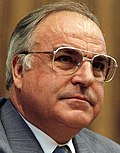| Date | Event |
|---|
| 4 November | A court in Augsburg filed an arrest warrant for Walther Leisler Kiep (who had served as CDU treasurer from 1972 to 1992) over accusations of tax evasion, [2] following an investigation into business deals involving Karlheinz Schreiber, a German arms dealer who resides in Canada. [3] [4] Kiep was accused of having received DM 1 million in cash from Schreiber without proper legal disclosure. Schreiber was also wanted by German authorities over unrelated charges, but his dual Canadian citizenship prevented his extradition. |
| 5 November | Kiep surrendered to the authorities and admitted that he had indeed accepted the money from Schreiber on 26 August 1991. The delivery of the money was at a highway service area in Switzerland and Horst Weyrauch, a financial advisor of the CDU, was there. [3] [4] [5] Kiep indicated that the money had been booked as a donation for the CDU. Subsequently, he was released on a bail of DM 500,000. [6] |
| 6 November | Helmut Kohl, former Chancellor of Germany (1982-1998) and CDU chairman (1973-1998) stated that he had no knowledge of any CDU earnings that violated the German party financing system. [2] [7] |
| 8 November | Weyrauch stated that the DM 1 million from Schreiber had been placed in an escrow account. Angela Merkel, then the CDU secretary general, demanded a "swift and comprehensive investigation" into the unfolding scandal. [6] |
| 12 November | Schreiber claimed that they had only served as intermediaries in the money transfer, which indeed had been intended as a hidden party financing. [7] Hints that the money had originated as a provisional payment from the government of Saudi Arabia following the delivery of German-made tanks (a deal which was believed to have been realized by Schreiber on behalf of CDU) were rejected by Helmut Kohl. |
| 23 November | In a TV interview, Kiep disagreed with Kohl's statement from 6 November and claimed that the CDU leadership had been informed about the money transfer. [6] |
| 26 November | Heiner Geißler, who had served as CDU secretary general from 1977 to 1989 (when he lost this post because of a disagreement with Kohl), confirmed the existence of covert party bank accounts. [5] [8] |
| 28 November | CDU party chairman Wolfgang Schäuble, a close ally of Helmut Kohl, gave a press statement assuring the public that there would be a "thorough investigation" into the scandal. He confirmed the existence of escrow accounts managed by Weyrauch on behalf of the CDU, but rejected the term "covert bank accounts". [6] |
| 29 November | German news magazine Der Spiegel published an investigative story uncovering that the revenue of the regional CDU branch in Hesse had seen a dramatic increase between 1989 and 1991, culminating in an amount of several million DM, [9] which the party had attributed to anonymous donations. [4] [10] |
| 30 November | Helmut Kohl accepted the responsibility for the scandal. He claimed that, due to his prominent position in the CDU during the 1980s and 1990s, he had been involved in the initiation of confidential donations to the party and affiliated organizations, [11] apologizing for the lack of transparency and possible violation of regulations imposed on German parties. [12] [13] |
| 2 December | The Bundestag voted for the installation of a special investigation committee into the scandal. [14] [15] [16] |
| 16 December | In a TV appearance, Helmut Kohl admitted that during his time as CDU chairman, up to DM 2 million had not been properly booked. [2] [17] He refused to name the donors, claiming that he was bound to his word of honor to keep the donations confidential. [18] [19] |
| 22 December | The Frankfurter Allgemeine Zeitung (FAZ) published an op-ed by Angela Merkel, in which she calls for her party to sever the ties with Helmut Kohl. [20] Since 1990, Merkel had been regarded as a protégé of Kohl, who had sponsored her political career. Her FAZ article is widely regarded as an act of emancipation from Kohl, which later allowed her to become the dominant figure in the CDU, a development culminating in her being elected chancellor in 2005. |
| 31 December | The CDU issued a modified financial report for the year 1998, which includes revenues of DM 2.3 million during the period of 1993–1996, which previously had not been accounted for. [21] |
|

